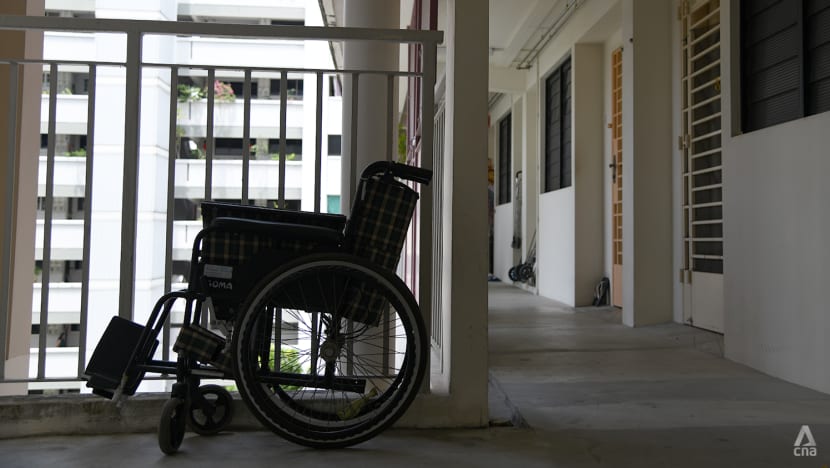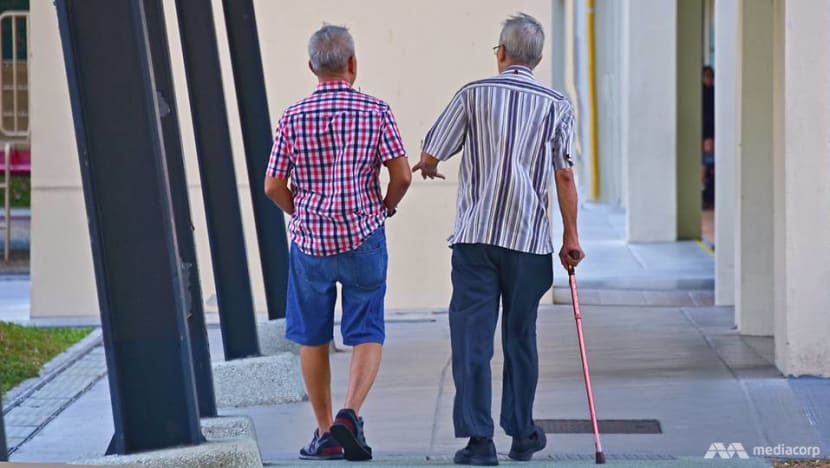Commentary: In hard times, everyone in Singapore still has something to give
At a time when services by non-profits and charities are more crucial than ever, inflation is a double whammy as prices rise and donations shrink, says Melissa Kwee of the National Volunteer and Philanthropy Centre.

A wheelchair seen along the corridor of public rental flat units in Singapore. (File Photo: CNA/Calvin Oh)
SINGAPORE: The Government announced a new S$1.5 billion support package to help Singaporeans cope with rising prices on Friday (Oct 14). Even with such efforts, eroded purchasing power and soaring interest rates mean many are tightening their purse strings.
Inflation affects all of us, but non-profit organisations (NPOs) are really feeling the pinch.
Higher prices often disproportionately affect low and middle-income households. In these tough economic times, NPOs and the services they provide are more crucial than ever – from providing aged care to seniors, helping families put food on the table or those coping with mental health, to name a few.
To help charities with fundraising efforts, Deputy Prime Minister and Minister for Finance Lawrence Wong, announced in Budget 2022 that the Tote Board and the Government will extend the dollar-to-dollar matching under the Enhanced Fund-Raising Programme.
SHRINKING DONATIONS
As people in Singapore worry about bills and try to save more, many may deprioritise charitable donations. Fewer people are giving and charitable giving is a “normal good” - people tend to give less when disposable incomes decrease.
There are signs that this may be happening now. Donations on national giving platform, Giving.sg, are down about 15 per cent in the second quarter of 2022, compared to the same period last year. In October, food charities that spoke to CNA said in-kind donations had fallen by about 15 per cent and cash donations by about 30 to 40 per cent compared to about a year ago.
Recurring donations of fixed amounts will also decline in purchasing power over time. We forget that S$1 today is less than S$1 tomorrow; donations tend not to increase with inflation.
RISING COSTS, MANPOWER CRUNCH
With overall inflation anticipated to come in at 5 per cent to 6 per cent for this year, NPOs are experiencing rising operating costs. Unlike the private sector, many NPOs deliver their services for free and are unable to pass on rising costs to their “consumers” or beneficiaries.
Any increases in cost, including wages, rent, and operating expenses all eat into the bottom line.
Mr Abhimanyau Pal, CEO of SPD, a charity serving people with disabilities, said: “We have seen our electricity bills increase more than two-fold in the first half of this year compared to 2021. This, coupled with overall inflation, increasing cost of manpower, utilities and goods and services add to operating expenditure.
"SPD’s operating cost has risen more than 10 per cent from 2019. Yet charities are hard-pressed to keep programmes and services affordable while maintaining service quality.”
NPOs have also always found it challenging to attract and retain talent. NPOs often cannot raise wages for their employees the same way businesses do, even without the tight job market right now.
Those who choose to devote their lives to the service of others are admirable. But relying on the call of the common good is not always enough when employees also have their own personal financial needs.
WHAT CAN NON-PROFITS DO?
NPOs are no strangers to stretching the dollar, but there are some things they could do to better engage donors.
First, communicate the compelling need for funds and the impact of the work un-done due to inflation. This may motivate donors with more means, including philanthropists and ultra high-net-worth individuals, to give more as well as more regularly.
There is a lot of money seeking impact but NPOs often talk about needs in broad strokes. Research indicates that providing tangible details about interventions (such as specific items or services the funds will buy for beneficiaries) increased donations.
Such details reinforce the participants’ belief that their generosity will have a positive impact. Let givers know how their gifts matter, and they will give more.
Second, use digital platforms to build meaningful relationships with donors. Such platforms provide information about donors’ interactions on fundraising and event pages on what engages them. For example, sharing stories – not just statistics – helps to build relational beyond just transactional giving.
In the future, the SG Cares Digital Kampong project will be a one-stop platform for NPOs to reach and better understand donors.

INDIVIDUAL AND COMMUNITY ACTION
But what else can we individuals do when inflation also hurts our pockets?
If purse strings are too tight, how about offering some of our time or skills? Stepping up to volunteer with NPOs can mean giving time to conduct classes for children whose families cannot afford tuition, mentoring online, helping to design a website or perform analytics, or using one’s voice and networks to advance a cause.
Everyone has something to offer – an hour, a listening ear, a skill, a voice. Giving is a human choice that reminds us that we need not be helpless or hopeless.
And research has shown that those who volunteer derive greater life satisfaction and a boost in mental health – a timely remedy for a society witnessing a decline in mental well-being. The annual SG Cares Giving Week, the national giving movement from Dec 1 to Dec 7, strategically targets the end-of-year blues and contemplation that parties and tax returns cannot suppress.
NON-PROFIT SECTOR STRUGGLES AFFECT US ALL
The implications of a struggling non-profit sector are far-reaching. Many societal needs of the vulnerable are addressed by NPOs when they bridge access to close disparities in wealth, income, education and opportunities.
Without their efforts and advocacy, these gaps will continue to widen. Studies have illustrated the detrimental impact of inequality on the whole of society, which ultimately affects overall economic growth.
We are also a richer society because NPOs help care for our environment, animals and neighbours, and promote sports and the beauty of our arts and heritage.
I will never forget the words of one of my mentees: “We didn’t always have enough to eat but we always had enough to share.” If you count yourself among the fortunate ones who can share, no sincere act is too small or insignificant.
We pushed through more than two years of the COVID-19 pandemic with our spirit of gotong royong, only for 2022 to show us the tough times are not quite over yet. We will need to flex our civic muscles for a while longer to weather what Senior Minister Tharman Shanmugaratnam has termed “the perfect long storm” ahead.
Melissa Kwee is passionate about building a culture of giving and other-centeredness, and is the former CEO of the National Volunteer and Philanthropy Centre (NVPC).



















